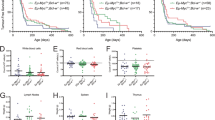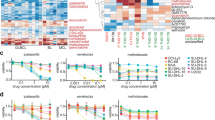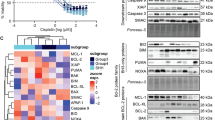Abstract
Bcl-2 can inhibit apoptosis induced by a variety of stimuli, including radiation and its presence in tumour cells would be expected to indicate poor prognosis. Bcl-2-expressing tumours, however, are often low-grade and highly responsive to therapy. To investigate this apparent paradox, we analysed in vitro the responses of Burkitt lymphoma (BL) cells to γ-irradiation in the presence and absence of Bcl-2. High-level expression of Bcl-2 was shown to promote BL cell survival following irradiation. However, a significant proportion of Bcl-2-rescued cells subsequently underwent apoptosis after an extended period in culture. In addition, in different BL lines, Bcl-2 was found either to promote or to inhibit long-term proliferative activity following γ-irradiation. This differential regulation of proliferation correlated both with differential effects of Bcl-2 on the cell cycle and with differences in p53 status. Thus, by one week after irradiation, BL cells expressing only wild-type p53 (wt/wt) had arrested in G1, whereas those with a mutant allele (wt/mu) were arrested in all phases of the cell cycle. The proportion of Bcl-2-rescued cells that subsequently underwent apoptosis was reduced by ligation of CD40 at the time of irradiation in wt/wt BL cells, but not in wt/mu cells. CD40-ligation reduced both G1-arrest and apoptosis in parallel. These results indicate that, whilst Bcl-2 can delay apoptosis in BL cells following γ-irradiation, the protein can also cause growth-arrest and thereby promote apoptosis. Long-term survival following Bcl-2-mediated rescue of γ-irradiated cells may depend on p53 status and require additional death-repressing or growth-promoting signals.
This is a preview of subscription content, access via your institution
Access options
Subscribe to this journal
Receive 50 print issues and online access
$259.00 per year
only $5.18 per issue
Buy this article
- Purchase on Springer Link
- Instant access to full article PDF
Prices may be subject to local taxes which are calculated during checkout
Similar content being viewed by others
Author information
Authors and Affiliations
Rights and permissions
About this article
Cite this article
Milner, A., Grand, R., Vaughan, A. et al. Differential effects of BCL-2 on survival and proliferation of human B-lymphoma cells following γ-irradiation. Oncogene 15, 1815–1822 (1997). https://doi.org/10.1038/sj.onc.1201355
Received:
Revised:
Accepted:
Issue Date:
DOI: https://doi.org/10.1038/sj.onc.1201355
Keywords
This article is cited by
-
DAF-16/FOXO targets genes that regulate tumor growth in Caenorhabditis elegans
Nature Genetics (2007)
-
Pathways of apoptotic and non-apoptotic death in tumour cells
Nature Reviews Cancer (2004)
-
Bcl-2 antisense therapy in B-cell malignant proliferative disorders
Current Treatment Options in Oncology (2004)
-
Micro-environmental factors in the survival of human B-lymphoma cells
Cell Death & Differentiation (2000)
-
A Caspase-Resistant Form of Bcl-XL, but Not Wild Type Bcl-XL, Promotes Clonogenic Survival After Ionizing Radiation
Neoplasia (1999)



